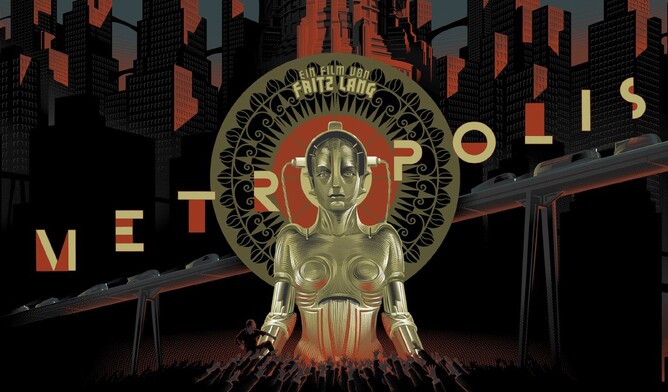In this part of our blog we are going to closely analyse intertextual examples from two of the prescribed HSC texts in Module A: George Orwell’s 1984 and Fritz Lang’s Metropolis.
Let’s dive into it.
Looking at these texts, it is clear that the composers are relaying the same warning to humanity about freedom and control. Orwell through his text however, gives a bleaker perspective of the future, while Lang, through his text, remains hopeful for the future of humanity. Although not his only contextual concern, Lang conveys a didactic message to his audience about the economic oppression induced upon Weimar Germany after the Treaty of Versailles. Comparatively, Orwell’s context was characterised by similar political turmoil with the rise of totalitarian leaders such as Stalin and Hitler playing a prominent role in history.
Let’s look a bit closer at these texts and find some specific examples:
Fritz Lang’s Metropolis
Example/Analysis/Techniques: The aftermath of the hyperbolic Moloch hallucination of Freder. The silhouettes of victims, which are represented as nothing more than blank, black images, are stretchered off in the foreground (which is characteristic of Lang’s German expressionist form). This is contrasted with Freder in the middle ground dressed in white distinguishing him from the prison-like costuming of the workers. (You can also look at what this costuming symbolises) Here, Freder’s bewilderment at the disposed human lives symbolically represents Lang’s concern and views upon the working class within Weimar Germany and how they were used as nothing more than tools of the economic machine.
George Orwell’s 1984
Example/Analysis/Techniques: Orwell’s 1984 is a didactic warning of the potential consequences, based on his contextual fears of World War 2, more specifically in Russia where the Stalinist regime were exerting their oppressive authority over their respective populous. Any individual in Stalin’s regime that was found as a ‘traitor’ of the Stalinist regime were sent to Gulag camps to work in horrendous condition. Orwell strongly conveys this restriction of individual freedom through, “If you want to picture the future, imagine a boot stamping on a human face - forever.” The metaphoric ‘stamping’ creates a strong violent image amongst the audience mimicking the brutality of the Stalinist regime. Furthermore, the caesura, which emphasises the word ‘forever’ serves as to represent Orwell’s fears about the future of humanity while dually serving as a warning about the dangers of oppressive regimes, such as Stalin.
Here’s a bonus question to help you practise writing responses to different types of questions:
“The composers of 1984 and Metropolis each reflect the threat to individuality and freedom posed by societal changes in their worlds.”
If you have anything to add feel free to leave your thoughts in the comment sections below.
Need HSC style questions for 1984 and Metropolis? Navigate to our English past papers.
*Please note that while this information is a great starting point for these texts, relying solely on the information in this post will not be enough to get a result in the top bands.

